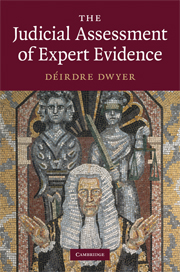Book contents
- Frontmatter
- Contents
- List of figures
- Preface
- Table of legislation
- Table of cases
- Introduction
- 1 General epistemological issues
- 2 Expert evidence as a special case for judicial assessment
- 3 Making sense of expert disagreement
- 4 Non-epistemological factors in determining the role of the expert
- 5 Assessing expert evidence in the English civil courts: the sixteenth to twentieth centuries
- 6 Assessing expert evidence in the English civil courts today
- 7 The effective management of bias
- Conclusion
- Appendix 1 Part 35 of the Civil Procedure Rules 1998
- Appendix 2 Tables of pre-1800 civil cases involving expert evidence
- Bibliography
- Index
- References
2 - Expert evidence as a special case for judicial assessment
Published online by Cambridge University Press: 01 July 2009
- Frontmatter
- Contents
- List of figures
- Preface
- Table of legislation
- Table of cases
- Introduction
- 1 General epistemological issues
- 2 Expert evidence as a special case for judicial assessment
- 3 Making sense of expert disagreement
- 4 Non-epistemological factors in determining the role of the expert
- 5 Assessing expert evidence in the English civil courts: the sixteenth to twentieth centuries
- 6 Assessing expert evidence in the English civil courts today
- 7 The effective management of bias
- Conclusion
- Appendix 1 Part 35 of the Civil Procedure Rules 1998
- Appendix 2 Tables of pre-1800 civil cases involving expert evidence
- Bibliography
- Index
- References
Summary
2.1 Introduction
The whole object of the expert is to tell the jury, not the facts, as we have seen, but general truths derived from his specialized experience. But how can the jury judge between two statements each founded upon an experience confessedly foreign in kind to their own? It is just because they are incompetent for such a task that the expert is necessary at all … The truth of either combating proposition lies just in its validity as an inference from a vast mass of experience … as to the truth of which trained powers of observation are quite essential, the result themselves of a life of technical training. What hope have the jury, or any other layman, of a rational decision between two such conflicting statements each based upon such experience?
The work of the previous chapter has provided us with a general epistemological framework to describe the judicial assessment of evidence. In particular, it has proposed that judicial justified belief should be explained in terms of a Haackian foundherentist model, it has identified features of judicial fact finding that distinguish it as a special form of epistemology, it has presented a meta-justification in the form of Twining's Rationalist Tradition, and it has analysed elements of that meta-justification, particularly atomism and the use of generalizations.
Chapter 1 began to allude to, but deliberately held back from fully engaging with, the question of how expert evidence fitted into this framework.
- Type
- Chapter
- Information
- The Judicial Assessment of Expert Evidence , pp. 74 - 132Publisher: Cambridge University PressPrint publication year: 2008



